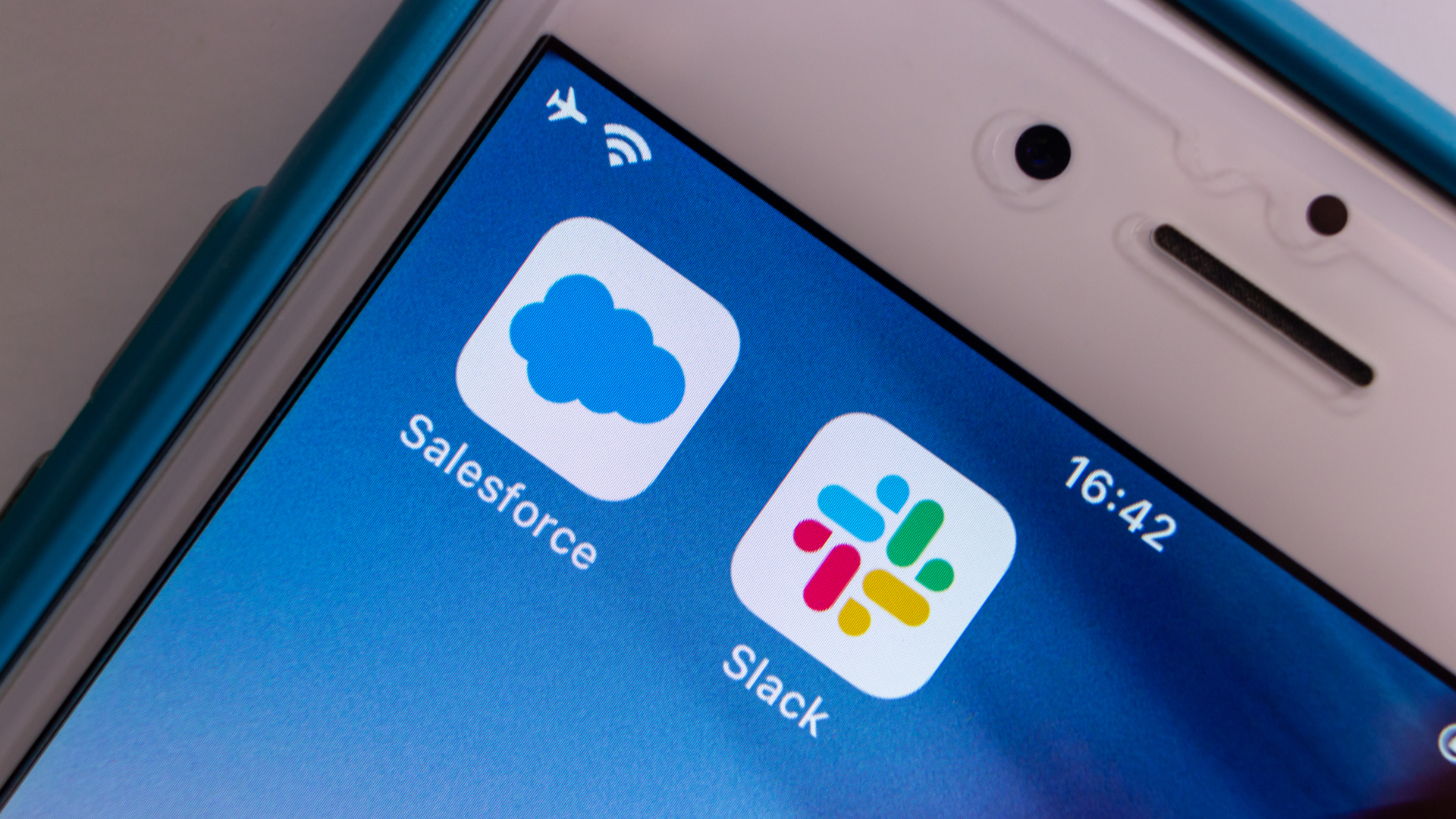Salesforce's $28bn Slack acquisition: What's next for workplace collaboration?
The CRM giant looks to rewrite the rules of work while expanding cross-business collaboration


Despite the eye-watering $27.7 billion (roughly £20.2 billion) fee involved, nobody raised an eyebrow at Salesforce’s acquisition of the workplace collaboration platform Slack in December 2020. Workplace collaboration is all the rage - especially following the pandemic – with several entities hoping to capitalise on the changing world of work, including Microsoft Teams, Facebook Workplace, and even Citrix, with its multi-billion-dollar Wrike acquisition.
Slack has long been one of the biggest names on the scene, although its early dominance was dwarfed by the emergence of Teams, which surged in popularity thanks to its capacity to tap into the ubiquity of Microsoft products.
With US antitrust regulators clearing the $27.7 billion deal this week – one of the biggest acquisitions in tech history – Salesforce is now free to position Slack as a much stronger challenger.
The CRM giant will also have been buoyed by a 36% surge in year-on-year revenue for the first quarter of the year, with Slack adding 13,000 more paid customers too, taking its total to 169,000. With late-2020 stagnation firmly in the rearview mirror, this is the sort of momentum Salesforce hopes to build on, as it eyes up expanding on cross-business collaboration and undergoing a fundamental rewiring of the nature of work.
Better connected
There were fears in December that Salesforce muscling its way into operations would spell the end for Slack as we knew it. Much of Salesforce's rhetoric over subsequent months, however, seemed to align well with Slack's existing plans; namely devising a means to replace email entirely in light of a longstanding antagonism to the legacy system.
Launched last June, Slack Connect is a way for organisations to add up to 20 others into a single Slack channel, allowing businesses to migrate supply chains and external ecosystems into a single hub. It was seen as a smart move – after all, what more proof might you need that you're onto something when Microsoft Teams launches an effective carbon copy feature? Salesforce sees this tool as the foundation for building on its vision for a ‘digital HQ’ that allows businesses to collaborate across the virtual borders traditionally established between companies.
“We couldn’t be more excited to have Slack as part of the Salesforce family, combining the #1 CRM and the trailblazing digital platform for the work anywhere world,” Marc Benioff, chair and CEO of Salesforce, said after the deal cleared. “Together we’ll define the future of enterprise software, creating the digital HQ that enables every organisation to deliver customer and employee success from anywhere.”
Sign up today and you will receive a free copy of our Future Focus 2025 report - the leading guidance on AI, cybersecurity and other IT challenges as per 700+ senior executives
Stewart Butterfield, CEO and co-founder of Slack, and Salesforce president Bret Taylor added in an interview with Reuters that this merger is an opportunity to connect customers to smoothen the process of making business deals. Slack channels, for example, can be recreated to replace all emails, phone calls, and video conferences that might otherwise occur between, say, a sales team doing a deal with a procurement team at another company. Slack's growing list of integrations also means that documents from third-party platforms such as Google Drive can be signed with services like DocuSign.
Reimagining the workplace
With this acquisition closing, Salesforce has been keen to push the idea of a ‘digital HQ’, which is very much an idea born of the effects of the COVID-19 pandemic. Companies across the world, the firm says, have learned that surviving as a business is incredibly challenging without means to connect with employees, customers, and partners through digital channels. As such, headquarters are no longer physical locations and are instead mostly based in the cloud, with every industry adjusting to a digital-first environment.
Alluding to the fundamental changes we’ve seen throughout the last few months, Butterfield, who will continue to lead Slack, sees the acquisition as “a once-in-a-generation opportunity to rethink and reshape everything about how and where we work”. The merger, the firm adds, will create a business operating system for whatever this new world of work is.
Although Salesforce says it’s committed to Slack’s roadmap and vision, with the platform continuing to operate under its own brand, the firm has suggested it will integrate Slack into its Customer 360 platform. Launched in 2018, this tool gives companies the capacity to connect Salesforce apps and create unified customer IDs to build a single view of the customer. It was built on the technology of a previous acquisition, MuleSoft, to allow companies to connect apps, data sources, and devices across any cloud service or on-premise server. Every Salesforce Cloud and industry-specific platform will now be deeply integrated with Slack, with the platform serving as the new interface for Customer 360.
Integrations remain a priority
Part of Salesforce’s mission to make the digital workplace more accessible also involves expanding the integrations and interoperability in Slack. Speaking to Reuters, Butterfield added Slack will continue to integrate with Microsoft, despite an intense rivalry, because that sits in line with the goal of making it easier for employees to get things done.
"What customers want is interoperability. They don't want to have to make hard choices,” he added. “We'll integrate with everyone – Microsoft and Salesforce, of course, but also ServiceNow and Workday, and more or less anyone you can think of."
RELATED RESOURCE

Given the expansion of remote working, changing workplace culture, as well as digitisation of the workplace, this could be one of the most important acquisitions in tech history in terms of its timing. This period is very much seen as a fresh start for defining the nature of work, and what the workplace means, although it’s not clear how things will settle once the pandemic is well and truly over and businesses embark on their next, more stable, chapter.
For all this talk about reimagining the workplace, a cross-industry disinclination to define what this actually means suggests it’s still very much an unknown quantity. This acquisition, however, might be the right deal at the right time for both Salesforce and Slack to attack this question head-on, and help position them as influential architects of whatever comes next.

Keumars Afifi-Sabet is a writer and editor that specialises in public sector, cyber security, and cloud computing. He first joined ITPro as a staff writer in April 2018 and eventually became its Features Editor. Although a regular contributor to other tech sites in the past, these days you will find Keumars on LiveScience, where he runs its Technology section.
-
 Redefining resilience: Why MSP security must evolve to stay ahead
Redefining resilience: Why MSP security must evolve to stay aheadIndustry Insights Basic endpoint protection is no more, but that leads to many opportunities for MSPs...
-
 Microsoft unveils Maia 200 accelerator, claiming better performance per dollar than Amazon and Google
Microsoft unveils Maia 200 accelerator, claiming better performance per dollar than Amazon and GoogleNews The launch of Microsoft’s second-generation silicon solidifies its mission to scale AI workloads and directly control more of its infrastructure
-
 Infosys co-founder Narayana Murthy called for a 70 hour week last year — now he says that’s not enough
Infosys co-founder Narayana Murthy called for a 70 hour week last year — now he says that’s not enoughNews Murthy thinks longer hours akin to China’s '996' approach are the key to success
-
 Microsoft could be preparing for a crackdown on remote work
Microsoft could be preparing for a crackdown on remote workNews The tech giant is the latest to implement stricter policies around hybrid working without requiring a full five days in the office
-
 IT professionals aren’t budging on flexible work demands – and more than half say they’ll quit if employers don’t meet expectations
IT professionals aren’t budging on flexible work demands – and more than half say they’ll quit if employers don’t meet expectationsNews Analysis from Randstad shows 40% of UK-based IT pros have quit over a lack of flexible work options, while 31% of workers globally have done the same.
-
 'Digital hide-and-seek': Workers are wasting hundreds of hours a year sourcing the information they need to carry out their role
'Digital hide-and-seek': Workers are wasting hundreds of hours a year sourcing the information they need to carry out their roleNews Knowledge workers globally are wasting a quarter of their working week tracking down information, new research from Atlassian has revealed.
-
 'The tide seems to be turning towards office attendance': 64% of hybrid business leaders want staff back in the office – but many worry that enforcing RTO mandates will drive employees away
'The tide seems to be turning towards office attendance': 64% of hybrid business leaders want staff back in the office – but many worry that enforcing RTO mandates will drive employees awayAnalysis Many UK business leaders want their staff back in the office more frequently, but they’re scared to implement return to office (RTO) mandates in fear of worker revolts.
-
 Employees are dead set on flexible working arrangements – three quarters would turn down a role that didn't offer hybrid options as work-life balance becomes more important than pay
Employees are dead set on flexible working arrangements – three quarters would turn down a role that didn't offer hybrid options as work-life balance becomes more important than payNews New research shows workers are increasingly demanding flexible working arrangements from employers.
-
 Nearly half of tech workers are seeking new roles – declining employee benefits and reduced flexible working options have staff looking elsewhere
Nearly half of tech workers are seeking new roles – declining employee benefits and reduced flexible working options have staff looking elsewhereNews While salaries are rising for tech workers, other benefits are in decline, leading to a fall in job satisfaction
-
 Untethered: How CIOs and CISOs are paving the way for the new hybrid workforce
Untethered: How CIOs and CISOs are paving the way for the new hybrid workforceWhitepaper Effective techniques to transition from exposed legacy infrastructure to an effective zero trust strategy